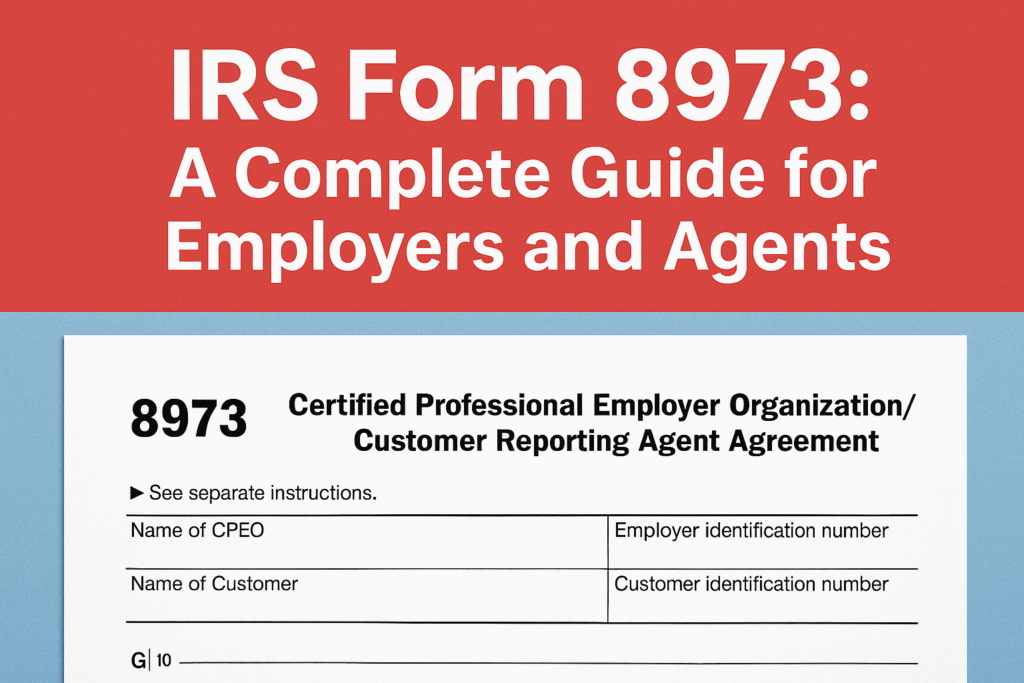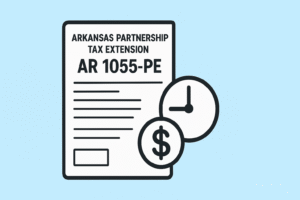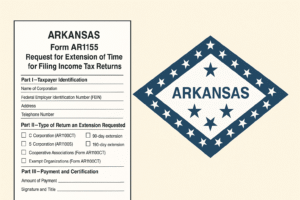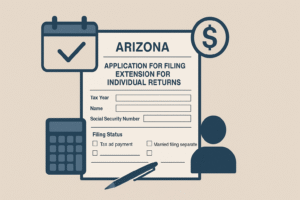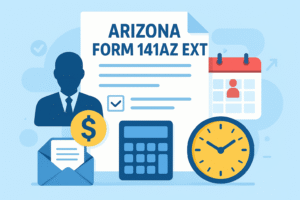Tax compliance can be complex, especially when it involves the delegation of payroll tax responsibilities. The IRS provides mechanisms that allow employers to designate reporting agents to handle specific tax filings and deposits on their behalf. One such mechanism is Form 8973, Certified Professional Employer Organization/Customer Reporting Agent Agreement.
This form is critical for businesses that partner with Certified Professional Employer Organizations (CPEOs) or other approved reporting agents to ensure that payroll taxes, deposits, and returns are filed accurately. Understanding who must file it, what forms it covers, and how to properly complete it is essential for smooth IRS compliance.
In this article, we’ll break down Form 8973 in detail, including eligibility, line-by-line completion, filing instructions, mailing addresses, and its validity.
What Is Form 8973?
IRS Form 8973 is officially titled “Certified Professional Employer Organization/Customer Reporting Agent Agreement.”
It serves as an authorization agreement between an employer (the customer) and a Certified Professional Employer Organization (CPEO) or reporting agent. Through this form, an employer allows the CPEO or agent to handle the filing of specific employment-related tax forms with the IRS.
The form is part of the IRS’s broader framework for ensuring compliance under the CPEO program, which was created under the Tax Increase Prevention Act of 2014 (TIPA).
By filing Form 8973:
- Employers formally notify the IRS that a CPEO or reporting agent is authorized to file and make deposits on their behalf.
- It ensures the IRS knows exactly which forms and responsibilities are being transferred.
- It helps protect both the employer and the IRS by providing a written, signed record of authorization.
Who Must File Form 8973?
Form 8973 is not filed by every business. Instead, it applies in specific scenarios:
- Employers who engage a Certified Professional Employer Organization (CPEO):
Businesses that outsource payroll functions and tax reporting to a CPEO must file Form 8973 to confirm the authorization with the IRS. - CPEOs themselves:
Certified Professional Employer Organizations must also file Form 8973 to notify the IRS of each client relationship where they are authorized to file certain tax forms. - Reporting Agents:
Some employers may also designate a reporting agent (not necessarily a CPEO) to handle filings. Form 8973 documents that agreement with the IRS.
Simply put: If a CPEO or reporting agent is going to file and deposit certain payroll taxes on behalf of a business, Form 8973 must be completed and filed.
What Forms Can Be Authorized Using Form 8973?
Form 8973 allows an employer to grant authority to a CPEO or reporting agent for specific employment tax forms. These include:
- Form 941 – Employer’s Quarterly Federal Tax Return
- Form 940 – Employer’s Annual Federal Unemployment (FUTA) Tax Return
- Form 943 – Employer’s Annual Federal Tax Return for Agricultural Employees
- Form CT-1 – Employer’s Annual Railroad Retirement Tax Return
This authorization ensures that the IRS recognizes the agent as responsible for preparing, signing, and filing these forms on behalf of the employer.
How to Complete Form 8973 (Line-by-Line Instructions)
Form 8973 is relatively short, but accuracy is critical because it establishes the legal agreement between the customer and the Certified Professional Employer Organization (CPEO). Below is the correct breakdown:
Part 1 – Why Are You Filing This Form?
Check one box to indicate the purpose of filing:
- A service contract started between the customer and the CPEO.
- A service contract ended between the customer and the CPEO.
- A correction to a previously filed Form 8973.
- Enter the date the service contract began or ended, depending on your selection.
Part 2 – Customer (Employer) Information
- Provide the employer’s EIN, legal business name, and address.
- Enter the name and contact details of the customer’s representative, if applicable.
- If reporting an ended contract, the customer’s signature here may be optional.
Part 3 – CPEO Information
Enter the CPEO’s EIN, name, and address.
Provide the contact person’s name and phone number.
Part 4 – CPEO Contract Status
Indicate whether the service contract falls under the CPEO program rules.
If “Yes,” enter the contract start date. This date cannot be earlier than the CPEO’s official certification date.
Part 5 – Signatures
For a new contract, both the customer and the CPEO must sign.
For an ended contract, only the CPEO’s signature is required.
For a correction, signatures follow the same rules as the original type of filing.
Part 6 – CPEO Consent to Disclosure of Tax Information
If filing for a new contract, the CPEO must complete this section.
This consent allows the IRS to share certain tax information between the IRS, the employer, and the CPEO for compliance purposes.
How to File Form 8973
Filing Form 8973 is relatively straightforward:
- Prepare the form – Complete all sections and ensure accuracy.
- Signatures required – Both the employer and the CPEO/reporting agent must sign.
- Mail the form to the IRS – Electronic submission is not available.
Where to Mail Form 8973
As of IRS instructions, Form 8973 must be mailed to the IRS Ogden processing center:
- Department of the Treasury
- Internal Revenue Service
- Ogden, UT 84201-0089
Employers should always verify the latest address in the official IRS instructions before mailing, as addresses may change.
How Long Is Form 8973 Valid For?
- Once approved, Form 8973 remains valid until it is revoked.
- Employers must submit a new Form 8973 if:
- They change reporting agents or CPEOs.
- They wish to update which forms are authorized.
- If the business relationship with the CPEO/agent ends, the authorization automatically terminates, and the IRS must be notified.
Final Thoughts
Form 8973 plays a crucial role in employer tax compliance by clearly documenting which party—the employer or their CPEO/reporting agent—is responsible for filing specific federal employment tax forms.
Employers who work with a CPEO or reporting agent should ensure that Form 8973 is properly completed, signed, and filed to avoid IRS confusion and potential compliance issues.
Given its importance in payroll tax administration, both employers and reporting agents should review the form carefully, maintain updated copies, and promptly file new authorizations if their arrangements change.
In short: Form 8973 is the IRS’s way of ensuring transparency and accountability in payroll tax filings when third-party professionals are involved.

